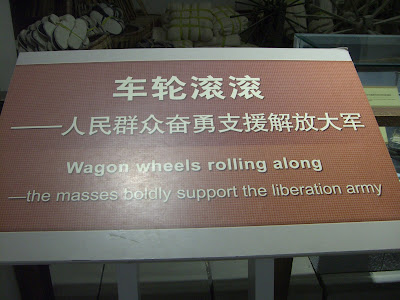The only thing I can remember that happened last week was our presentation to the sixth grade, which basically means that last week was pretty boring.
While we're here, we have to give several presentations to various people/grades on America culture. When the Jingshan kids were in America last fall, they gave the same kinds of presentations on Chinese culture. We gave this one to the sixth grade, which is about 100 kids (I think). We made a massively large powerpoint presentation, in which we talked about various aspects of American culture, such as school, food, hobbies, TV/movies, etc. My topic was TV/movies, so I made a short slideshow with pictures of different genres of movies and TV, including The Dark Knight, Grey's Anatomy, Law and Order: SVU, Gossip Girl (at the urging of Hannah), and Slumdog Millionaire. I simply explained each type of movie or TV show, and asked the kids which one they liked the most.
The funnier parts of our presentation were as follows: Elias "singing" the YMCA song, teaching the kids the wave, teaching them "Take Me Out To The Ball Game", and mistakenly writing in Chinese next to the picture of the swimming pool "swimming car" instead of "swimming pool" (the word for pool and car sound the same, but are NOT the same character). It was overall a really fun/funny experience and I'm psyched to do it again this Friday, this time with the 8th graders.
This week will definitely be an eventful one. Monday, we go to Beihai Park which is a little NW of the Forbidden City. On Tuesday, we turn in our first paper (yay!) of the trip and then venture to the Forbidden City. I'm really excited for that not so much because we're going to the Forbidden City, but because we're going to the Forbidden City in 75 degree weather!!! Thursday we're going to an exhibit on Tibet at the Nationalities Center, and Friday we give our second presentation. Hopefully it will be a fun week.
On another note, Spring has arrived!!! In Beijing, it switches from winter to spring almost overnight, with no real transitional period. One week it was cold and cloudy, the next it was warm and sunny. Today it was a balmy 65 degrees!! I'm loving the warmth, after what seemed like such a snowy winter (in Newton, I mean. I didn't even get half the snow, after I left Boston got hit with a few more feet of snow!). It's great to feel spring in the air again, though it makes me miss home a bit. I always love the way spring smells in Newton, especially right after it rains. That's what I miss most about home, the feeling I get after a spring rain, when you can smell the flowers blooming and the warmth of the sun and that nice breeze just take you away.
Enough daydreaming, I'm off to bed. I promise I'll post more this week, as I'll definitely have more to talk about. Zaijian!



















